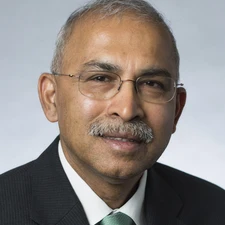Ravendra Naidu

The 2023 Alina Kabata-Pendias Medal is awarded to Ravendra Naidu for outstanding research on developing better ways to assess, characterise risks of, and remediate contaminated soil, and the potential impacts of contaminants on environmental and human health.
Ravendra (Ravi) Naidu is internationally recognised as a leading researcher in soil and environmental sciences, having contributed deeply to our understanding of contaminant bioavailability (the proportion of a substance that enters the circulation and can therefore influence people, animals, plants or microbes) and now widely accepted ‘risk-based’ approach to managing contaminated sites. He has also been a leader in the shift to in situ remediation – cleaning up contamination where it lies, rather than the traditional ‘dig and dump’ approach making clean-up far more economically feasible and effective.
He is the Founding Director of the University of Newcastle’s Global Centre for Environmental Remediation (GCER) and CEO and Managing Director of the Cooperative Research Centre for Contamination Assessment and Remediation of the Environment (CRC CARE). His research records (Scopus source: 920 journal articles, 42036 Citations, 97 h-index; top 1% of environmental scientists in the world by Clarivate) illustrate both his productivity and impact in the field of soil and environmental sciences as well as his outstanding contribution as a mentor to the next generation of environmental scientists. In recognition of his contributions, the United Nations Food and Agriculture Organisation (FAO) has appointed him as the chair of the International Network on Soil Pollution (INSOP) established in 2022 as an urgent response to scale-up global efforts to prevent contamination of arable soils by chemicals, fertilisers and plastics, with the goal of zero pollution.
In his early work and leading research at CSIRO Land and Water as Chief Research Scientist, Ravendra Naidu researched natural clay minerals and patented a modified clay (matCARETM), capable of remediating PFAS-contaminated water applied at several polluted sites in Australia.
Ravendra Naidu has established strong collaborations and networks in both developed and developing countries leading the training of many researchers and international students through workshops, collaborative research projects and external grants. Research funding also supported his work in the establishment of environmental science research facilities in India (Tamil Nadu Agricultural University) and Bangladesh (Dhaka University).
It is impressive to see how Ravendra Naidu is multi-awarded and recognised from around the world in the area of soil system sciences, playing a leading role in understanding the whole cycle of soil pollution, from assessment to remediation to the food chain, and finding ways to prevent and clean it up, to protect both human health and the environment. Awarding him the Alina Kabata-Pendias Medal is inspiration the next generations of researchers.
